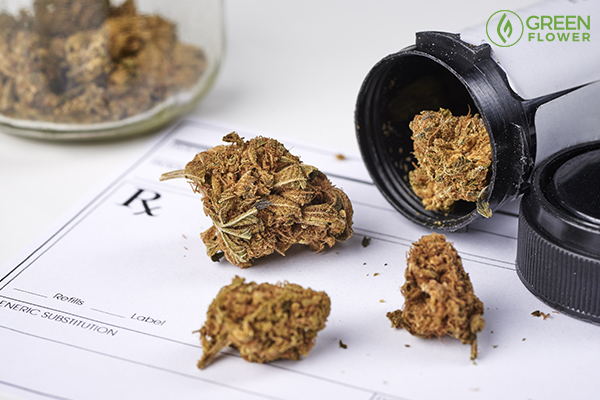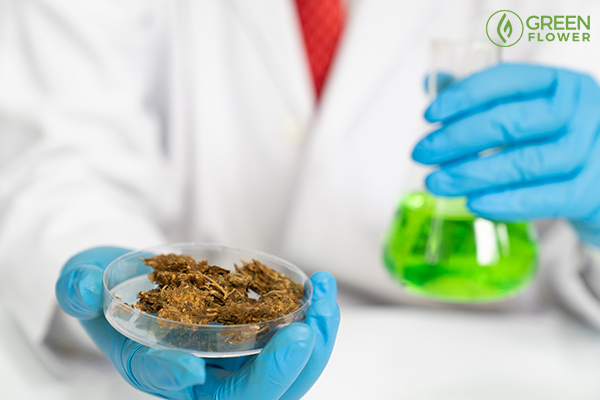
Cannabis use continues to rise across the United States and the world at large.
As 31 states and the District of Columbia have implemented medical cannabis programs, cannabis and its role as a medicine is gaining prevalence, despite lacking federal recognition of its medicinal value.
It’s no surprise Washington continues to shuffle their feet around cannabis policy, but isn’t it about time doctors – a profession rooted in science and reality – received an adequate cannabis education?
How else can doctors in over half the country possibly give their patients the guidance they deserve?
What EVERY Health Expert Should Know
Have you heard of the endocannabinoid system (eCS)?
Almost every living creature with vertebrae has one (1).
Named after the plant that led to its discovery (cannabis), the endocannabinoid system is one of the most widespread and powerful physiological control systems in the human body (2).
It helps balance nearly every metabolic process in the body, from fertility to pain perception to emotion, and so much more(1,2)
Pointedly, several different chronic diseases and conditions are thought to be a direct result of eCS imbalance or dysfunction (7).
Understanding how the eCS works with respect to both our internal cannabinoids and those exogenously produced, like in the cannabis plant, is undeniably vital to human physiology.
Given its significance, just how prevalent is cannabis education and eCS science in allopathic medical schools today?
Most Conventional Health Professionals Know Very Little about the eCS

An independent survey study by Dr. David B. Allen, a 30-year veteran heart and general surgeon, showed only 13.3% of the 157 accredited U.S. medical schools teach or offer any type of endocannabinoid and/or cannabis education.
Dr. Allen himself claims the eCS is the “single most important discovery in modern medicine since the recognition of sterile surgical technique.”
With so few MD programs offering any sort of cannabis education, it’s no wonder doctors today are so ill-equipped to effectively treat medical cannabis patients.
With more and more people turning to cannabis for relief, the inability of physicians to guide them on their journey is essentially creating a “clinical gap” between patient and provider that is wider now than ever before.
Understanding the Clinical Gap
Cannabis is a versatile yet relatively safe and sophisticated living medicine.
Millions turn to it for relief for numerous ailments every single day.
It breaks the boundaries and limitations of single-molecule synthetic drugs and trumps other plant species with its intra-species diversity and vast clinical applications.
However, navigating the waters of cannabis therapy can be frustrating and difficult for patients; it is far from easy.
They need expert, educated medical guidance on how to approach their medical cannabis treatment.
What “Different” Looks Like in Medicine: A Day at Innovative Express Care
Dr. Rahul Khare, CEO and President of Innovative Express Care, has a passion for integrating cannabis into his practice.
His phenomenal team of clinicians, right in the heart of Chicago, offers a variety of cutting-edge treatments. From ketamine infusion therapy to medical cannabis consultations and certifications, along with primary care, urgent care, and pain management.
Being that his clinic is fairly close to Rush Medical Center, where I do congenital heart disease research during the day, I had the fortune of visiting his practice for a little investigative reporting on one of their cannabis clinic days.
In short, it was like nothing I’ve ever experienced at a doctor’s office.
A Chicago Practice that Empowers their Medical Cannabis Patients
For Dr. Khare, a former Chicago Cubs ER Physician, it’s all about the patients.
They inspired him to integrate medical cannabis into his practice.
“I had many patients who used only cannabis. When I asked them about their story, they told me how they had come off of opiates or benzos with cannabis,” Khare says.
“Then it became legal with medical cannabis, so I started certifying because of all the anecdotal stories. Then my own patients reduced their [dose of] opiates and benzos, and I was sold. I’ve been a believer since. Now the clinical research is catching up.”
Not Your Typical Doctor’s Office
Inside Dr. Khare’s clinic, you can say goodbye to your typical physician’s quiet, dusty old waiting room.
From the modern design to the genuinely kind and compassionate disposition of the staff, it became immediately clear this was not your usual doctor’s office.
Upstairs in the cannabis clinic, while waiting to see the doctor, patients engage in an interactive and dynamic experience in medical cannabis education.
They have the opportunity to ask questions and gain an intuitive understanding of the medicine by none other than Innovative Express Care’s own talented, charismatic and compassionate cannabis consultant: Farah Morales.
Farah: The Charismatic Cannabis Consultant
A vibrant and highly empathic person, Farah shares her deep connection with the cannabis plant and its ability to heal many of her patients.
Conversations flow freely and Farah is always on her toes, answering a barrage of questions with grace, wisdom and the warmest smile you’ve ever seen.
As she let me try different CBD oils/balms and smell an array of different strains (in their respective empty bottles), she talked to me about using my sense of smell to help predict cannabis effects unique to me, in addition to explaining the lab values on the packaging (containing the percent of THC, THCA, CBD, CBDA, etc.) and how they are to be used.
Elaborating on her overall perception of cannabis, she explains: “I strongly believe cannabis is preventive medicine and understanding how the plant works at optimal levels at various layers in the human body is your highest possibility for recovery, healing and quality of life.”
Doctors That Actually Know What They’re Talking About
Once you’ve had an interactive and informative experience consulting with Farah, you’re called to see the doctor.
Feel free to be surprised when you realize the doctors at the clinic are in fact educated on the endocannabinoid system and have indeed received a comprehensive medical cannabis education.
They will help you identify your treatment goals (e.g. reduce night terrors from PTSD), dosing protocols and recommended delivery methods.
The team will also help identify any possible adverse interactions as well as follow-up with patients in person and via telemedicine and advise any necessary adjustments to optimize treatment strategy.
Physicians taking the time to educate and empower their patients is a beautiful thing.
For example, while the average doctor might tell you “CBD is good for inflammation”, Farah and other members of Dr. Khare’s cannabis team will go further to explain the lipophilic (“fat-loving”) nature of cannabinoids like CBD, and how they must be used consistently to allow for its “accumulation” in one’s body (4).
Now that is a good example of how cannabinoid therapy is practiced!
Treatment Begins with Getting Your Cannabis Card, Not Ends
Dr. Khare’s clinic is one of the only ones I know of that actually follows up with their patients after they receive their medical cannabis card.
Many patients never see their “cannabis doctor” ever again once they get their card in the mail.
Thankfully, at Innovative Express Care, patients have the opportunity and are encouraged to follow up with their physician to continually assess progress and make necessary adjustments.
While my experience at that clinic was extraordinary, for Dr. Khare and his practice, it was just another successful “cannabis day” at his clinic.
Putting the “Medical” back in Medical Cannabis
The medical cannabis community is one that is close-knit and often relies on each other instead of institutions.
It battles politically motivated policies that undermine basic human rights to a healthy life.
The medical cannabis movement has always been patient-driven. Even in the face of powerful political opposition, it continues to build momentum as public opinion to evolve in favor pro-cannabis legislation.
The powers that be and the dumpster fire that is (and always will be) prohibition, has left long-lasting damage and a deep mistrust between patients, healthcare providers and the governing bodies who could, but refuse, to change outdated legislation that continues to restrict our ability to study the plant.
As illogical and ill-conceived as our laws surrounding cannabis may still be, there are many doctors, like Dr. Khare and his practice, that are working for the benefit of the patient, not prejudiced and outdated policy.
The truth is, cannabis is a complex and tricky plant that does not work for everyone.
Navigating Medical Cannabis Therapy Isn’t Easy
Walking into a dispensary can be intimidating and finding the best products to achieve treatment goals is far from easy.
Just as a doctor or pharmacist would offer legally and scientifically sound counsel on any other medication, doctors and medical institutions have the responsibility to integrate cannabis education and the internal system it acts upon in the body into the medical education curriculum.
We can no longer expect dispensary staff and budtenders to bear this burden of spanning the clinical gap.
Why are so many healthcare providers, specifically doctors, missing from the medical cannabis realm today?
No Reason to Hold Back Cannabis Education
Skeptics continue to decry, “there isn’t enough research!”
Yes, we do need more research around cannabis. And yet we already know more about it than most people realize.
Go to PubMed.gov, the U.S. repository for medical literature, and you’ll find over 28,400 studies published on cannabis.
Tylenol brings in about 22,000 results.
Ritalin will pull up 8,680 results.
Aside from this, cannabis has been recognized as a medicine for thousands of years. Prohibition is fairly recent compared to that and is backed by zero science.
Prohibition also fails to account for the body’s endocannabinoid system and how cannabis has proven to be an excellent supplement for targeting this system, relieving many different types of ailments and conditions.
Meanwhile, countries like Israel are light years ahead in their medical cannabis research and clinical experience.
Why are so many medical schools ignoring this?
Even in states that have had medical cannabis programs for years, most physicians and hospital facilities are ill-equipped to even answer cannabis questions, let alone provide cannabis treatment.
This is an important public health issue – not a matter for the DOJ and bureaucrats who don’t have a medical license.
True, cannabis has a lot of catching up to do when it comes to large-scale, double-blind, placebo-controlled trials. However, we know enough about the plant and the endocannabinoid system, that this shouldn’t prevent us from embracing it now.
Fortunately, high-quality, industry-sponsored cannabis education programs are beginning to emerge and can help bridge the divide between patient and provider.
Certification & Training Programs Can Be a Solution
A certification program would likely help physicians remain up to date on the literature regarding the endocannabinoid system. After all, it’s already been established with sturdy research that it has immense implications on the human body and how it functions.
In fact, Green Flower recently launched an online academy dedicated to cannabis education and certification. Just another step towards bridging this clinical gap and giving physicians and patients what they need.
Time to Integrate Cannabis Education into Academic Curriculums

The only way we can begin to optimize cannabinoid therapy for patients is by breaking the mold and integrating endocannabinoid and cannabis education into the medical curriculum, as well as those in other sectors of healthcare (e.g. nurses, physician’s assistants, etc).
While the DEA continues to stonewall research attempts due to the federally restrictive scheduling of cannabis, there is absolutely nothing stopping allopathic medical schools from teaching future MDs what we do know about the endocannabinoid system (which is a lot).
Osteopathic and Naturopathic medical schools have already begun, putting future DOs & NDs at a clear advantage over their allopathic (MD) counterparts (5,6).
Closing Thoughts: Higher Standards for Cannabis Education
The endocannabinoid system is more than just a small part of who we are. It’s arguably involved in almost every physiological and biological process involving who we are and the status of our health (7).
We can either pretend this incredibly significant element of the human body doesn’t exist (not recommended), or we can do something about it and start implementing evidence-based cannabis education into healthcare education curriculums around the country.
We Deserve Better
Patients deserve the best, safest and most effective care medicine has to offer.
Humanity deserves the opportunity to continue its pursuit inward, into themselves and their biomechanical and physiological workings.
The mainstream medical community can no longer stand on the sidelines; simply authorizing patients for their medical cannabis card is not enough.
The time to bridge this clinical gap is now; not just for the sake of the patients and physicians, but all of us.
References
Become Skilled & Confident Helping People Benefit from Cannabis
Discover the online Cannabis Patient Care Certificate Program…
Download your free brochure to learn more




